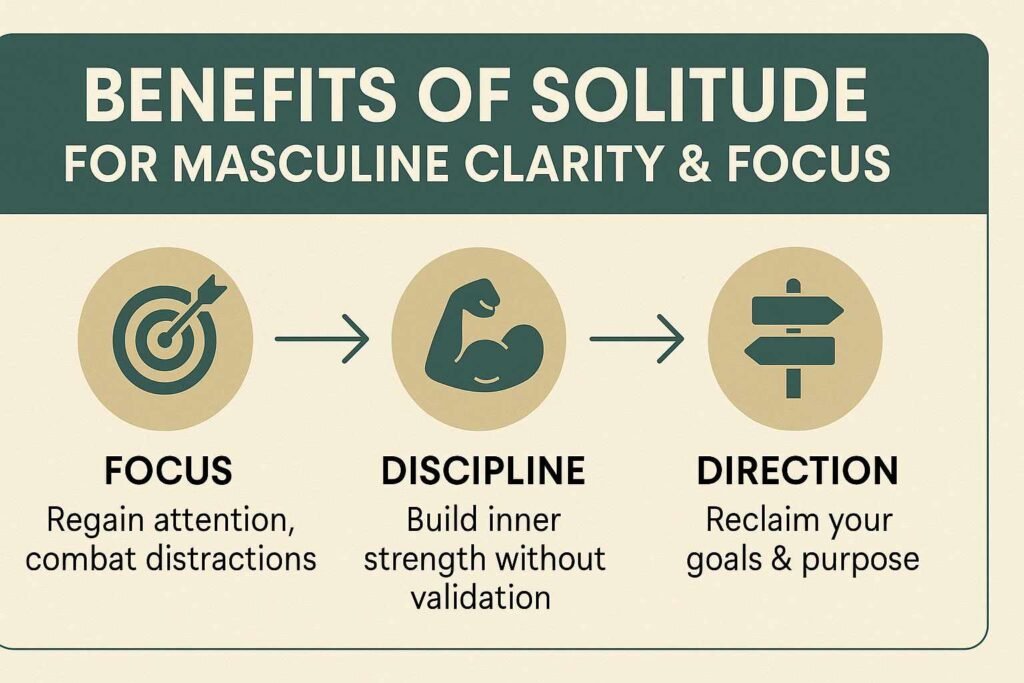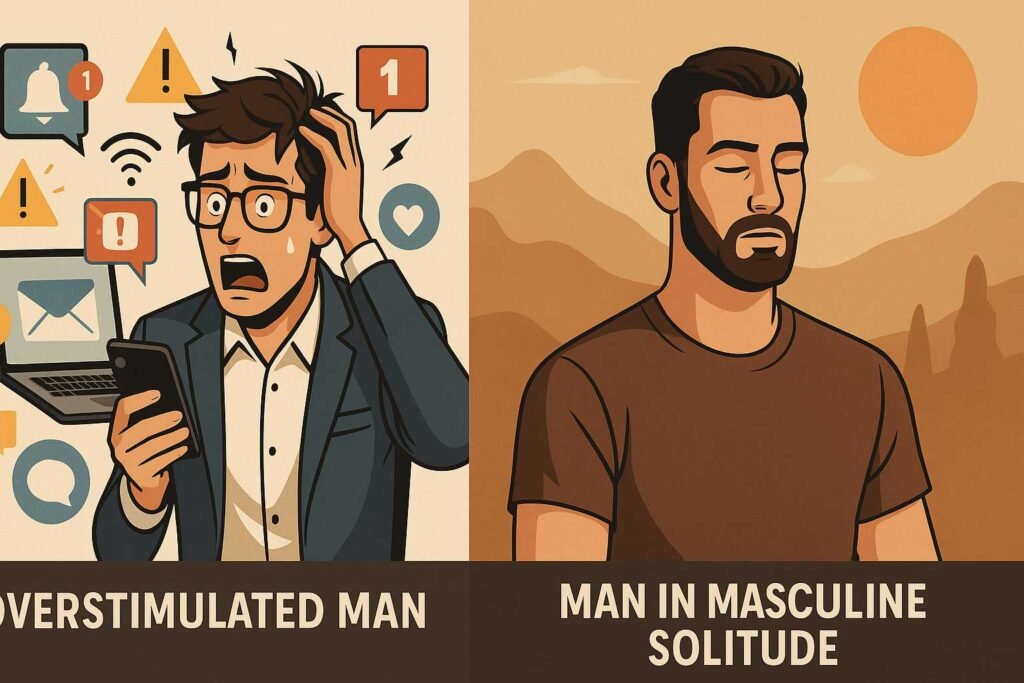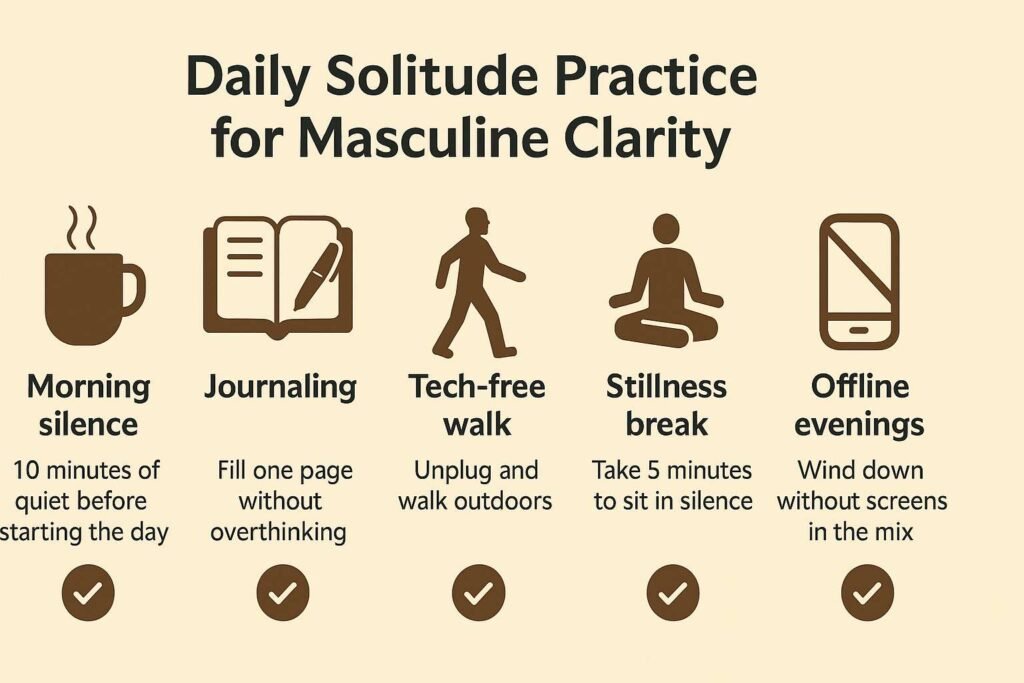Introduction: Silence Isn’t Weakness, It’s a Weapon
We live in a world that never shuts up. Notifications buzz. Algorithms scream. Productivity gurus chirp like caffeinated parrots. And somehow, in this noise, men are expected to “man up”, which apparently means never sitting still, never pausing, and definitely never being alone with your thoughts.
But here’s the twist most men miss: solitude isn’t about being antisocial. It’s about being so in control of your inner world that you don’t need the noise to feel relevant. In fact, if you’re serious about reclaiming your edge as a man, learning to lean into silence is non-negotiable.
The power of solitude isn’t just a poetic phrase; it’s a performance enhancer. A psychological fortress. And quite possibly, the most underrated masculine upgrade you’ll ever adopt. The truth is, solitude is the pre-workout your testosterone actually respects. Because it’s in silence that your nervous system recalibrates, your thoughts untangle, and your primal clarity returns.
And let’s be honest: in today’s dopamine-drenched world, choosing solitude over screen time is basically a rebellious act. A form of modern monk mode, minus the robe, plus the reason.
This article is about tapping into that often-ignored superpower. How masculine men don’t run from silence. They master it. And how you can use it to sharpen your focus, elevate your emotional endurance, and yes, quietly dominate.
Spoiler: monks and Spartans were onto something. And your algorithm-addicted brain could learn a thing or two from them.
Table of Contents
Why Solitude Is Underrated (But Never Weak)
You’ve probably heard it all: “Lone wolves die,” “Community is key,” “Connection heals.” And yes, connection matters. But here’s the irony no one talks about: if you don’t know who you are alone, you’ll lose yourself in any crowd.
Solitude isn’t retreat, it’s reconnaissance. It’s where you meet the unfiltered version of yourself without the distortion of performance or external applause. And let’s be honest: if you can’t stand your own company for 10 minutes, maybe it’s time to stop blaming your environment and start upgrading your internal operating system.
Science backs this up:
- Regular solitude has been shown to reduce cortisol (the stress hormone) and improve decision-making (source: APA).
“Science backs this up” - Time spent alone actually increases empathy, which is ironic, considering most people think solitude turns you into a cold monk.
- Hormonal bonus: consistent deep thinking and emotional regulation may support stable testosterone patterns and reduce reactive behaviours.
Culturally, we’ve swapped campfires for comment sections and self-reflection for Spotify queues. We don’t think in solitude anymore. We scroll. And we wonder why our clarity feels hijacked.
Solitude is not a timeout for the weak. It’s a tune-up for the strong.
Want to be dangerous in a good way? Sit with yourself. Most men can’t. They’d rather bench press their feelings or binge a podcast that screams “optimise” every 30 seconds.
But real optimisation? It begins in the quiet. And your nervous system knows it before you do.
How Solitude Helps Masculine Energy Reboot

Let’s get this straight: solitude isn’t just some poetic flex for monks and mountain men, it’s a biological reset button that most modern guys never press. In a world where everything beeps, pings, scrolls, and swipes, choosing silence is like walking into the storm with zero armour… and discovering you didn’t need armour at all.
You’re not just decompressing, you’re rebuilding. Solitude isn’t a timeout; it’s training. And not the “look-at-me-on-Instagram” kind. It’s the gritty, quiet, internal work that doesn’t trend but transforms.
Every time you unplug, you sharpen:
- Focus: Let’s be honest, most men can’t make it five minutes without checking their phone. Solitude reclaims your attention and teaches your mind to stop chasing shiny things like a dopamine-addicted squirrel.
- “Want to weaponise your focus? Start here.”
- Discipline: When no one’s watching, do you still show up? Solitude teaches you to act without applause, and in a world obsessed with being seen, that’s real strength.
- “Discipline is built in the shadows, not the spotlight—this guide shows how.”
- Direction: Ever felt like your goals are loud but your purpose is silent? That’s a clarity problem. Solitude cuts through the noise so you can hear your own mission, not just what everyone else thinks you should be chasing.
Solitude is where real masculine leadership is cultivated, not in the spotlight, but in the shadows. It’s not glamorous. It’s gritty. But it’s yours. And it builds a man that doesn’t flinch when the world gets loud, because he already knows how to command the quiet within.
3 Signs You Need Solitude (Like, Now)
Let’s not sugarcoat it, most men are unknowingly overstimulated zombies with a motivational podcast in one ear and a to-do list screaming in the other. Solitude isn’t just a nice idea; it’s an emergency exit your nervous system is begging you to take.
Here are three flashing warning signs you need to unplug, now:
- You get anxious when it’s too quiet.
Silence makes you itch. The moment the noise drops, you reach for your phone. Not because there’s something urgent, but because your brain has forgotten how to just be. That’s not normal, that’s a dopamine debt. - You feel the need to “prove” yourself online or at work constantly.
Every post, every project, every flex is secretly asking the world: “Am I enough yet?” Solitude strips that false armour off. If the idea of sitting alone with your thoughts makes you twitchy, that’s exactly why you need it. - You can’t remember the last time you felt truly clear-headed.
Your brain is buffering. Constantly. Ideas feel fuzzy, your goals feel scattered, and your decision-making is slower than your gym buddy on leg day. That mental fog? Solitude clears it like a cold plunge for the soul.
If these hit too close to home, don’t panic, just pause. You don’t need a monk retreat. You need a moment. Preferably now. Preferably daily. And preferably without Wi-Fi.
“Brotherhood and solitude go hand in hand. Learn why your support system matters.”

How to Create a Solitude Practice (Without Going Full Hermit)
You don’t need to disappear into the mountains or buy a yurt. You don’t need to grow a beard that scares children or sit on a rock until you hallucinate visions of your spirit animal. Let’s keep this grounded and man-friendly.
Building a solitude practice isn’t about becoming a monk. It’s about becoming a man who can hold space for himself, his mind, and his mission.
Here’s how to start, without turning your life upside down:
- Morning silence: Before the world gets loud, and before your group chat starts firing memes, carve out 10 minutes. No phone. No scrolling. No input. Just sit. Drink coffee like a ritual, not a rush.
- Solo walks: Not a power walk. Not a podcast-fueled productivity parade. Just walk. Let your mind wander like it used to before you needed noise to feel occupied.
- Journaling: One page. Stream of thought. No grammar police. This isn’t for Instagram, it’s for excavation. Dig into the mental clutter and see what surfaces.
- Tech breaks: Pick one block of time, even 2 hours a week, where you go offline on purpose. Not because you forgot your charger. Because you chose peace over pings.
“Structure turns solitude into power—this system builds both.”
Solitude doesn’t mean going off the grid. It means becoming harder to shake because your clarity isn’t dependent on chaos. The goal isn’t to escape life, it’s to master how you meet it.
When you can sit with your own mind without needing to mute it, you’re not just practising solitude. You’re practising sovereignty.
Tools to Help You Recharge in Solitude
Let’s be real, solitude sounds noble until you try it and realise your brain starts sounding like a YouTube comment section five minutes in. This is where a few tools can help you bridge the gap between overstimulated and grounded.
- Noise-cancelling headphones – These aren’t luxury flexes. They’re shields. Block out the hum of traffic, the TV next door, or that one coworker who types like they’re sending Morse code.
- Apps like Freedom or One Sec – Want to know what addiction feels like? Try deleting Instagram for a day. These apps help retrain your attention span so your mind doesn’t twitch every time it’s not being fed content.
- “This app helps retrain your attention span.”
- “…so your mind doesn’t twitch when it’s not being fed content.”
- Books like ‘Stillness Is the Key’ by Ryan Holiday – This isn’t just about reading. It’s about realigning. If you need proof that solitude builds empires, this is your manual.
- “Stillness builds empires—start with this read.”
- Physical journaling tools – There’s something primal about pen and paper. No tabs. No alerts. Just your thoughts, unfiltered and unedited. This is where solitude becomes insight.
- Analogue timers or sand clocks – Yes, we’re going medieval. Because watching grains of sand fall does something magical: it slows you down, resets your tempo, and reminds you that not everything needs to happen at Wi-Fi speed.
“Cold showers and solitude? Your nervous system will thank you.”
These aren’t props. They’re portals. They guide your brain from chaos to clarity, not by adding more input, but by creating the space for output. Solitude isn’t passive. It’s active stillness. And with the right tools, it becomes easier to access.
Frequently Asked Questions (FAQ)
Q: Isn’t solitude just a fancy word for loneliness?
A: Not at all. Loneliness is the absence of connection. Solitude is the presence of intentional stillness. One drains you; the other refuels you.
Q: How much solitude is too much?
A: If solitude becomes avoidance, where you’re using it to escape reality rather than engage with it more powerfully, that’s too much. Otherwise, daily doses of intentional silence are gold.
Q: I’m busy. Can 10 minutes of solitude really do anything?
A: Absolutely. Even 5–10 minutes of unplugged silence can reset your nervous system, sharpen focus, and improve emotional regulation. It’s less about quantity and more about consistency.
Q: Can solitude help with anxiety or burnout?
A: Yes, studies show solitude, especially when paired with journaling or nature, can reduce stress and help you reconnect with yourself, lowering overwhelm and emotional reactivity.
Q: Do I have to meditate to benefit from solitude?
A: Nope. You just have to be. Meditation is a tool, but walking alone, sitting quietly, or thinking without input are just as powerful.

Conclusion
Solitude isn’t a luxury. It’s a masculine necessity.
In a distracted, overstimulated world, the man who masters silence becomes a weapon. A lighthouse. A storm walks calmly through the noise.
Don’t wait for burnout to rediscover your stillness.
Start today. Schedule your next hour of silence like it’s a business meeting, because it is. One of the most important people in your life: you.
- Want more clarity like this? Subscribe for more.
- Share this with a brother who’s always “on.”
- Your edge is waiting in the quiet. Go meet it.

Suggested Articles for Next Read
- Modern Brotherhood: Why Masculine Men Need Strong Male Circles
Brotherhood and solitude go hand in hand. Discover why connection strengthens your core as much as silence does. - Discipline Over Motivation: A Masculine Framework That Actually Works
Motivation fades. Discipline, often forged in solitude, builds a lasting identity. - The Masculine Discipline System: Daily Structure for Mental Sharpness
Learn how solitude fits into a powerful daily routine that sharpens the mind and stabilises emotions. - How to Build Unshakable Focus as a Man in a Distracted World
Silence is your ally in a noisy world. This article teaches you how to weaponise it for clarity. - Cold Showers & T-Levels: Do They Actually Work for Men?
What other habits, like solitude, support real hormonal health? Let’s look at the science, not the hype.


